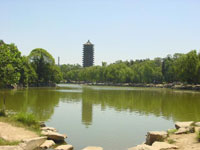| Tools: Save | Print | E-mail | Most Read |
| A Destination to Be Explored |
| Adjust font size: |
Few realize what a beautiful campus The handwriting of Chairman Mao, who was an assistant librarian here in 1918, can be seen on signs of the buildings. In the Edgar Snow, author of the world-famous "Red Star Over China," was a journalism professor in the 1920s at the university and made contributions to Sino-US relations during the 1940s and 50s. There is a memorial to him on campus near There are several gates that lead into campus - East, West and South gates. Yet each of these gates are specifically for cars or just for people to walk through. These rules are taken seriously. Security will stop you if you try to go through the wrong gate. The most popular one is the "West Gate" and many tourists take pictures here. Alumnae donated the gate in 1926. During the Cultural Revolution, the stone lions that guard the gate were almost destroyed by Red Guards. It is said that other students from the university protected the lions and would not let them be demolished.
The lake was once a part of a royal garden in the Qing dynasty and is still regarded by visitors as sacred. The lake is right in the middle of campus and many students can be seen studying around it. During the winter when the lake freezes over, students walk on the lake or skate on it. The marble boats by There are also museums on campus to check out. There's the Museum for University History as well as the Remarkable items in the museum include funerary objects that were excavated from the graves of feudal lords thousands years ago. There were ritual pottery vessels as well as brilliant and elaborate pieces of jewelry on display. There were also bones of human remains set up in a traditional burial style of that period. There are also many monuments dotted throughout the campus. One monument was donated by As you walk through campus there are buildings, classrooms and dorms. Most have a Chinese-style architecture but there are a few modern buildings as well. A word of advice though: when visiting and snapping pictures, be sure to quietly observe and not speak loudly near classrooms. After all, at its core Along with shops, places to eat, and vendor's carts lining popular spots with cold drinks, snacks and PKU memorabilia to buy, enjoying the scenery and history (chinadaily.com.cn by Tabitha Messick June 22, 2007)
|
| Tools: Save | Print | E-mail | Most Read |
 |
| Related Stories |
|
Product Directory China Search |
Country Search Hot Buys |

